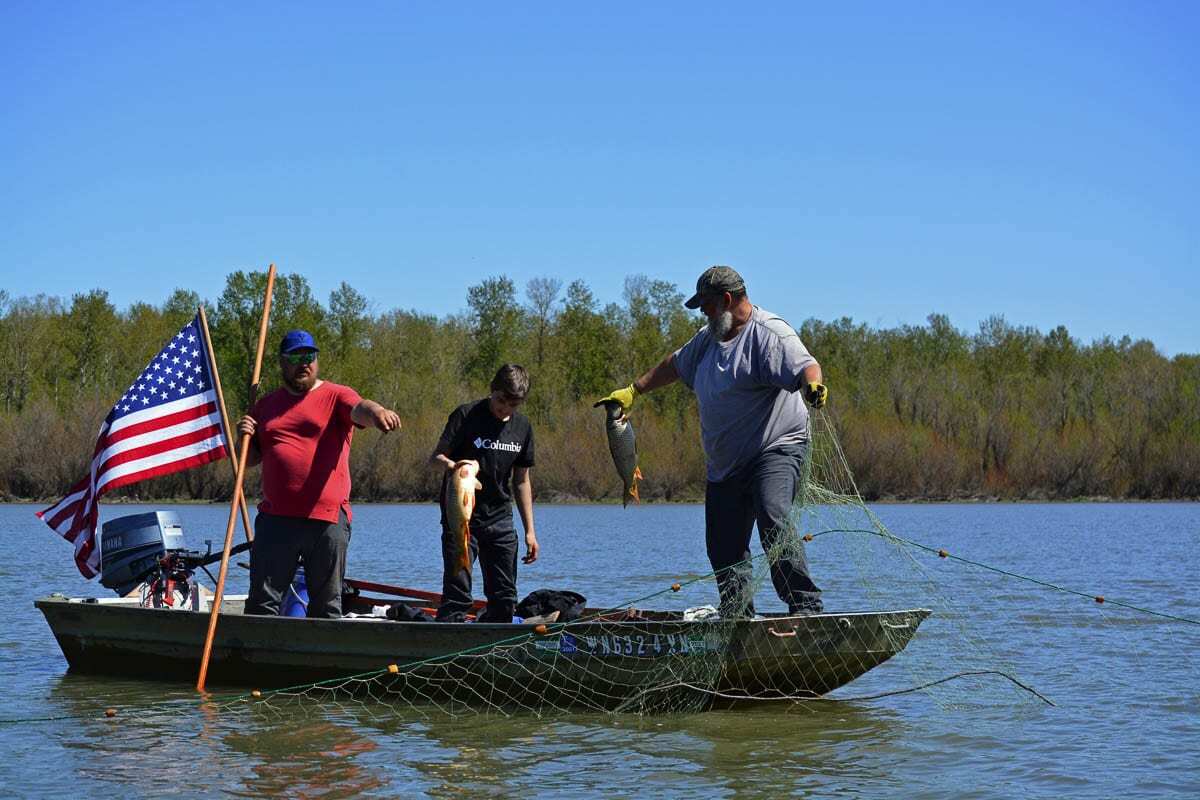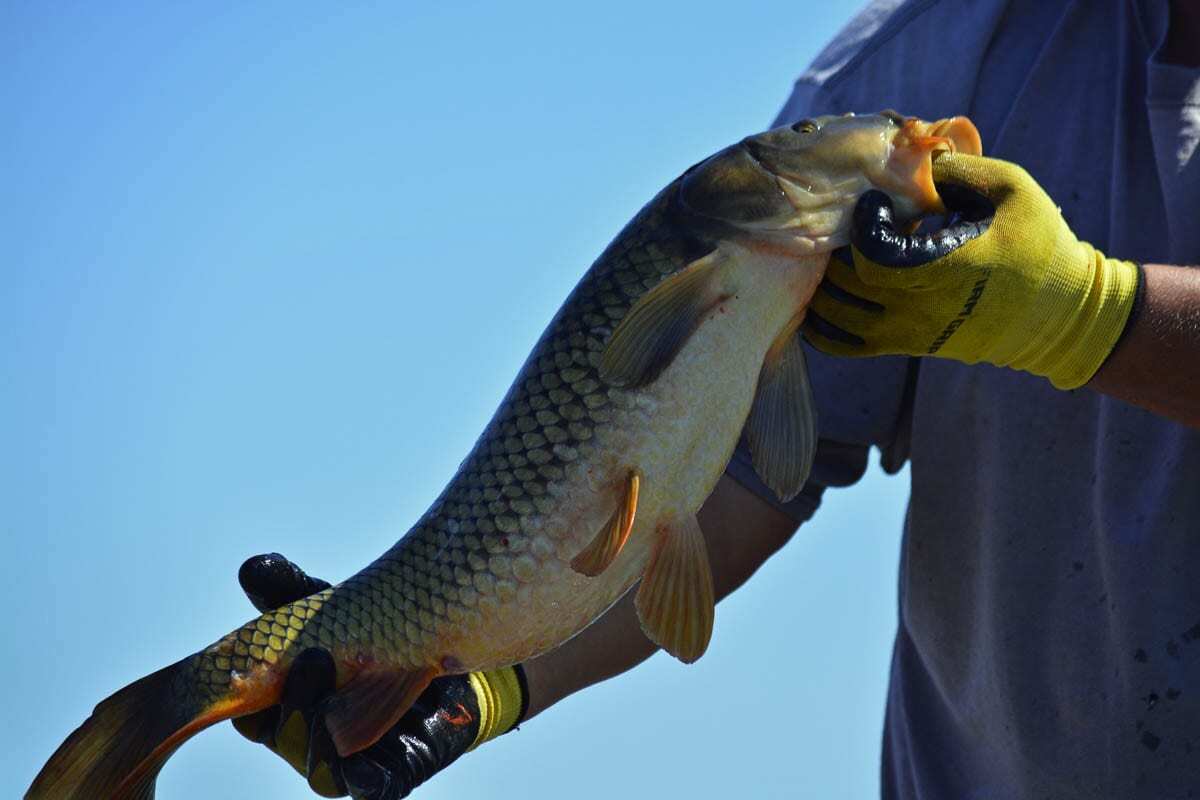First phase of a $15,000 Friends of Vancouver Lake long-term project to improve water quality
After a $157,000 herbicide application removed the Eurasian Watermilfoil weeds overtaking Vancouver Lake, a Spokane-based fishing company, hired by the Friends of Vancouver Lake (FoVL), removed 1,615 invasive carp during a tedious six-day process of netting, dragging, plucking and untangling one fish after the other.

This is the first phase of a $15,000 long-term project to improve water quality and recreational opportunities at the lake. Carp like to nestle at the bottom of the lake, and when they swim, they kick up phosphorus sediments that rise up into the water column and lead to the spread of toxic blue-green algae.
“Every time you see a fish moving and it creates this muddy, smokey substance, that’s phosphorus going into the water column. With the right conditions, that phosphorus feeds the algae and the algae just multiples,” said FoVL Co-Chair Kathy Gillispie. “And the lake doesn’t have a chance because we don’t have enough water circulation. The flushing channel from the Columbia River does not bring in enough water to circulate the lake and push out to Lake River.
“That’s a bigger problem to solve,” she added. “But pulling out biomass that we know directly contributes to turbidity and to bringing phosphorus into the water column is a great investment.”
Anton Reutov agrees. His crew plans to return to Vancouver Lake in May and remove carp for four more days.
“If Anton pulls out 1,500 or 2,000 fish, that’s 2,000 steps toward better water quality and better summertime water for the people of this county,” Gillispie said as she watched Reutov, his son Conan, and Arty Kuzmin spend about an hour pulling up their nets and collecting 21 carp, one or two at a time.
“It gives me a lot of appreciation for their work,” she added. “Just backbreaking work.”
Waste Connections will transfer most of the carp to Dirt Hugger in Dallesport, a city on the Washington side of the Columbia River about 100 miles east of Vancouver. The fish get grinded up and used to create fertilizer, soil supplements and other organic products.
“We are lucky to have this pathway established because you can’t just dig a hole in a field and throw fish in, even if they are invasive fish that don’t belong here,” Gillispie said.
These are small deposits to ensure that Vancouver Lake remains a unique destination for Clark County residents and visitors. A large rowing community helps organize the Junior Regional and the Masters Regional championship events at Vancouver Lake every year. These regattas provide about a $2.5 million boost to the economy.
“In 2018, this park was closed for 112 days during the summer,” said Vancouver Lake Rowing Club President Alan Stewart.
SePRO interviewed Stewart for their Lake and Pond Heroes series about Vancouver Lake and tackling the milfoil infestation.
“That was a really huge concern for us as a rowing community,” he said. “We had to do something, or otherwise, we wouldn’t be able to host these regattas.”

The Friends at Vancouver Lake nonprofit organization formed to get the milfoil outbreak under control. Stewart reached out to Terry McNabb, owner of AquaTechnix in Bellingham, for help. McNabb suggested the use of ProcellaCORE, an herbicide that would kill off the weeds without harming swimmers, boaters, fish or wildlife.
Ten days after the application in July 2020, Gillispie and Stewart could see the results. They went all around the lake and didn’t see any of those toxic, floating mats. Three months later, the Department of Fish and Wildlife retested the lake and couldn’t find any milfoil at any of their survey points.
Stewart shared a conversation he had with a sailor in the SePRO video who got tangled up in the milfoil weeds a few years ago. He returned to the lake this year and was surprised by the improvements.
“He went sailing through that same spot and said it was wonderful. No more weeds. This is fabulous what you’ve done here,” Stewart stated.
Gillispie hopes the carp removal has a similar desired effect. She envisions Vancouver Lake as a recreational gem with chairs and umbrellas lined up along the shore, people renting kayaks and paddleboards, and buying hot dogs and drinks from a concession stand.
“We need Clark County, the Port of Vancouver and the City of Vancouver to participate fully in saying, as a group, we want to see better water and we want to see more people here enjoying the lake,” Gillispie said.
“When you look at a map of Vancouver, you see the river, you see the lake, you see the wildlife refuge to the north. And then you see all these highways and freeways leading to the airport and these big population centers,” she added. “It doesn’t take a genius to say, ‘Wait a minute, Vancouver Lake could be a huge recreational mecca. Look how close it is to people, and it’s this big expanse of open space.’ We just think there is a lot of potential here.”




